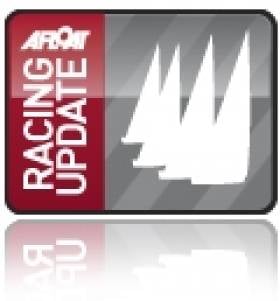Displaying items by tag: J
J Cup Sets Sail off Guernsey
While the Irish J109 just sailed its national championships as part of last weekend's Volvo Dun Laoghaire Regatta the international J Cup 2011 has kicked off in Guernsey. The cup, celebrating its tenth anniversary this year is being hosted by the Guernsey Yacht Club for the third time. The J-Cup is sponsored by B&G, Dubarry of Ireland, North Sails, Universal Marina and Nautical Guernsey. Racing is taking place across four classes, and the regatta includes the inaugural Lombard J/97 UK National Championship, which is being raced according to the J/97 UK One-Design Class Rules. Competitors have travelled to the Channel Islands from as far afield as Dublin Bay to compete in the regatta and the fleet also includes several local boats. Having enjoyed a fantastic Vin D'Honneur Reception in sparkling evening sunshine at Castle Cornet on Monday night, courtesy of The Sates of Guernsey, competitors set sail for the J-Cup race-course in The Little Russell on Tuesday morning in a brisk North Easterly breeze which topped out at 23 knots as the day progressed.
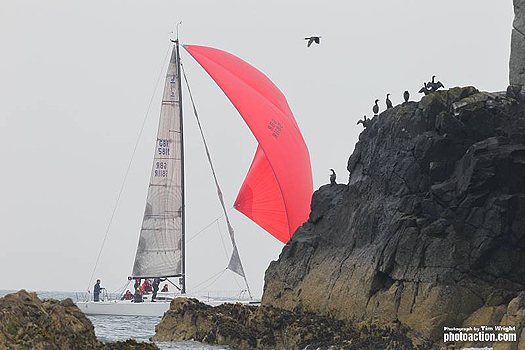
The Lombard Marine Finance J/97 UK National Championship fleet sailed three races on windward leeward courses and the competition was predictably fierce and hotly fought. Grant Gordon's Fever is leading the Nationals at the end of Day One having won the first two races and scoring a third in the final race of the day. His lead though is just one point over Tony Mack's McFly in second overall. Mike and Jamie Holmes took a little while to get Jika Jika driving as well as they they would wish but a bullet in the final race of the day saw them back to their usual top form. Stuart Sawyer and his crew on Black Dog, (all the way from God's Country, Cornwall) are just one point behind Jika Jika in fourth. The North Sails Boat of the Day prize for the Lombard Marine Finance J/97 UK National Championship was presented to Tony Mack's McFly.
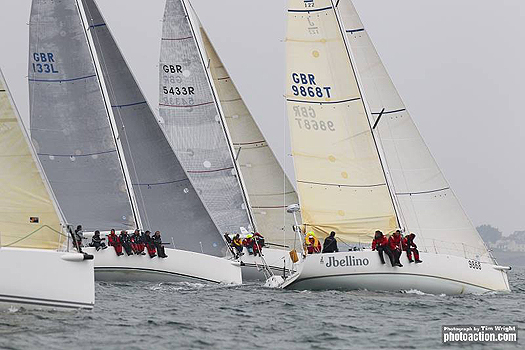
Class IRC 1 comprises J/122s, J/133s and two of the new J/111s. This fleet enjoyed a short jaunt around the cans in Little Russell followed by a coastal race around the island of Sark. Nigel and Donna Passmore won both races in their J/133 Apollo 3 and established a nice points lead on the next three boats in the class, which are all tied on eight points. The points count-back for these three boats puts Key Yachting's J/111 J Spirit (which is being helmed by St Peter Port local ace Jamie Hamilton) in second, Mick Holland and Carolyn Aylmer's J/122 MaJic (also from St Peter Port) is in third place and Rob Craigie's J/122 J Bellino (just back from the AZAB Race) is currently in fourth place. The North Sails Boat of the Day Prize for IRC 1 was presented to the crew of Apollo 3.
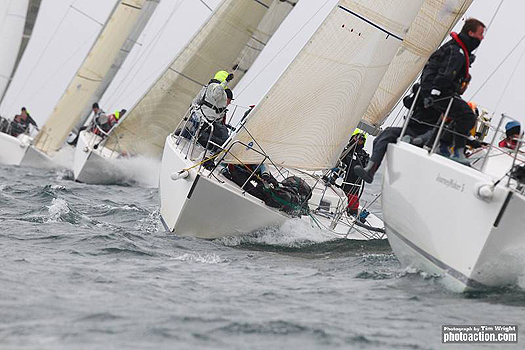
William Newton's J/105 Jelly Baby tops Class IRC 1 at the end of the first day of racing having scored two wins and Chris Jones and Louise Makin's J/105 Journeymaker is currently second in this class with six points. The J/105s love the windy stuff and enjoyed the planing conditions on Tuesday but here again, there are three boats all tied on six points. Andy Howe and Annie Kelly's J/92 Blackjack is third going in to the second day of racing and Marc Noel from St Malo also has six points on J/92 Dr Jekyll and is currently fourth. Two local J/24s, Alastair Bisson's Guffin and Tim Martin's Jaygo, have joined the J-Cup this year: the only time the regatta has ever included an entry from this first, iconic keelboat from the J Boats design office. Jelly Baby scooped the North Sails Boat of the Day prize in IRC 2.
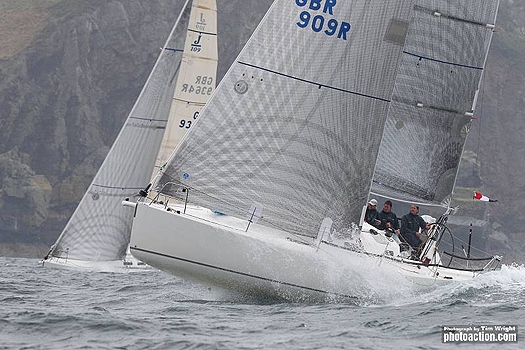
There is always much good natured rivalry in the J/109 fleet and the class enjoys close one-design racing in big fleets. This year we are especially entertained by the competition between local lad Mike Henning, racing on Jamie Arnell's Jeez Louise and his father Simon who has joined the crew of Roger Martel's Moojo, a well known St Peter Port J/109. Jeez Louise showed blistering pace and won both races on Tuesday, but yet again, the next three boats in this class are all tied on six points! Johnnie Goodwin and Bruce Huber are looking very good indeed on board Alexabelle in second, Tony De Mulder's Victric is third in class on count-back and then it's Moojo in fourth at the current point in time. There is obviously much to play for here. The crew of Jeez Louise were especially excited to receive the North Sails Boat of the Day prize after this stellar first-day performance.
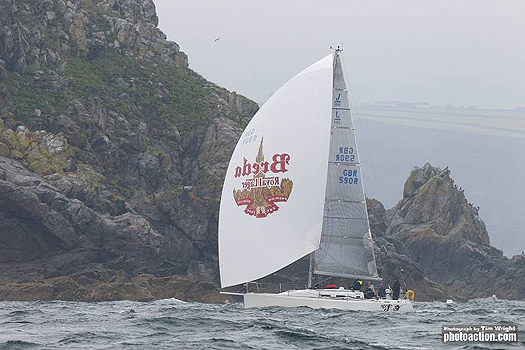
After racing, 350 J Boaters danced the night away to an awesome local folk band called The Barley Dogs fuelled by a curry at the Guernsey Yacht Club and some very potent cocktails courtesy of Universal Marina, one of the principal sponsors of the J-Cup. Racing at the J-Cup 2011 continues on Wednesday, and the forecast is for slightly less breeze and more sunshine


























